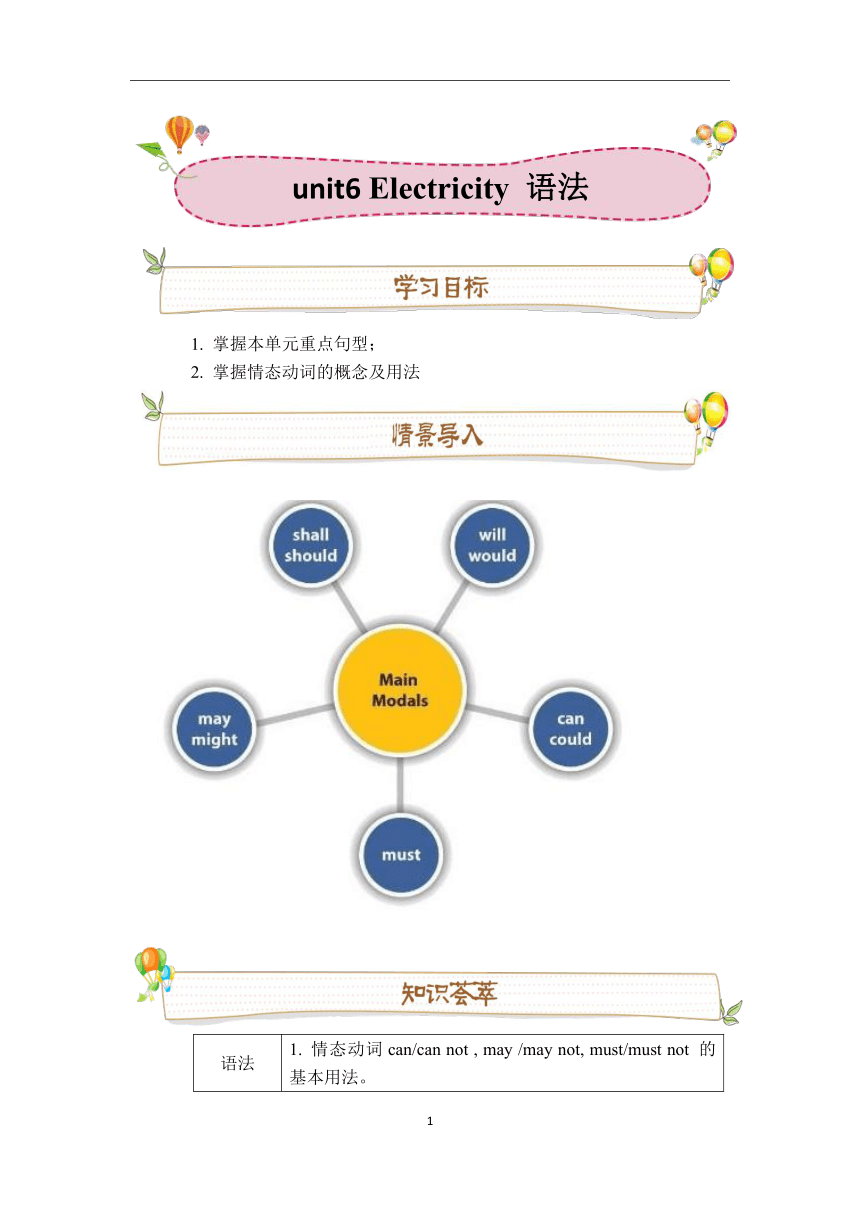
1. 掌握本单元重点句型; 2. 掌握情态动词的概念及用法 语法 情态动词can/can not , may /may not, must/must not 的基本用法。 can的用法。 表能力 We can do our homework by ourselves. 我们可以自己完成作业。 He can swim well. 他游泳很好。 I can play football but I can’t play the piano. 我会踢足球但是我不会弹钢琴。 2)表许可 You can watch TV after supper. 晚饭后你可以看电视。 You can’t play basketball in the street. 你不能在街上打篮球。 表请求 Can you help me with my math? 你能帮我学数学吗? Could you lend your book to me? 你能把你的书借给我吗? 注意:could 是can的过去式,但是这里并不表示过去时,而是表示委婉语气。 拓展:can 和be able to的区别 (1)情态动词can只有两种时态形式,现在式can和过去式could,而be able to有多种时态形式。在一般过去时中都表示能够时,两者可以互换。 例如:Mary can play the piano. (一般现在时) 玛丽会弹钢琴。 She could / was able to play the piano when she was five. (一般过去时) 她五岁时就会弹琴。 She has been able to play it since she was five. (现在完成时) 她自从五岁起就会弹琴了。 (2)用在过去时中,could经常表示能够做某事,事实上不一定去做,而was ?were able to则表示“过去设法做成了某事”。在否定句中两者可通用。 例如:He could swim across the English Channel. But he didn’t want to do it that day. 他能游过英吉利海峡,但那天他不想游。 Yesterday I was able to get home before the heavy rain. 昨天我在下大雨前赶到了家里。 表示“不可能……” 情态动词can的否定式,可以用来表示否定的推测,意为“不可能……”。 例如:That can’t be her father, because her father has gone to England. 那个人不可能是她爸爸,因为她爸爸已经去英国了。 2. may 1)表示请求和允许 例如:May I borrow your bike? 我可以借你的自行车吗? You may go home now. 现在你可以回家了。 2)表示推测 情态动词may表示推测时,意思是“可能(会),或许(会)”。 例如:It may rain tomorrow. 明天可能会下雨。 She may be at home. 她可能在家呢。 3)may的过去式 may的过去式为might,语气比may弱。表示推测时,可能性低于may。 例如:He is away from school. He might be sick. 他离开学校了,可能是他生病了。 4)表示希望、祈求、祝愿 may表示希望、祈求、祝愿时,常可译为“祝…,但愿”。 例如:May you have a good time. 祝你过得愉快。 May you be happy! 祝你幸福! May you succeed! 祝你成功! 3. must 1)表必须 情态动词must在肯定句中后跟动词原形,表示“必须”的含义。 例如:You must finish your homework on time. 你必须按时完成作业。 We must?return the books on time.?我们必须按时把书归还。 2)在否定结构中表“禁止,不许” 例如:You mustn't leave here. 不允许你离开这儿。 You mustn’t shout in the classroom. 禁止在教室喊叫。 3)表推测 must用于肯定句中的推测,意为“一定是……”。 例如:He must be ill. He looks so pale.他肯定是病了。他的脸色那么苍白。 The light is on, so he must be at home now. 灯亮着,他现在肯定在家。 4. have to have to是一个词组,相当于情态动词,表示“不得不,必须”。一般现在时中,当主语是第三人称单数时,要将have变成has。一般过去时中,要将have变成had。 例如:We have to be quiet in the library. 你必须在图书馆保持安静 She has to finish her homework before she goes home. 她在回家前必须完成作业。 拓展:ha ... ...
~~ 您好,已阅读到文档的结尾了 ~~